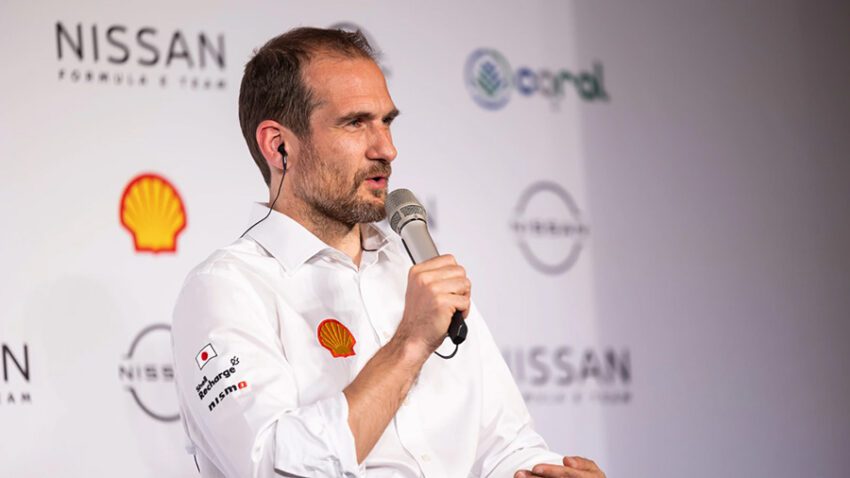
Inside Nissan’s Formula E transformation: electrification, ambition, and a shot at the title
In the high-stakes theatre of Formula E, Nissan is no longer just a participant—it’s a frontrunner.
From a supporting role to outright championship contention, the Japanese manufacturer has reshaped its racing ambitions to match its broader electric vehicle strategy.
At the helm of this transformation is Tommaso Volpe, Nissan Formula E Team Principal and Managing Director, who sat down with me during the London E-Prix weekend to offer a rare insight into how motorsport is driving Nissan’s electric future.
“We’ve been in Formula E since 2018,” says Volpe, “but for the first four years, it was more sponsorship than control. We were involved, yes, but not steering the ship.” That changed in 2022, when Nissan formally acquired the e.dams team, relocated key R&D staff from Japan to France, and embedded motorsport into the heart of its EV development.
That move coincided with the launch of Ambition 2030, Nissan’s roadmap to becoming an all-electric brand by the end of the decade. “The board asked whether we should stay in Formula E—and the answer was yes, but with full control. We wanted the programme to be meaningful.”
Since taking charge, Nissan’s performance curve has risen sharply. In its final season under the sponsor model, the team finished tenth. In its first full campaign as Nissan, it moved to seventh. Last year, fourth. And this season, they’re battling Porsche for the Teams’ and Manufacturers’ Championships—while already celebrating the Drivers’ crown with Oliver Rowland.
Volpe believes this success is more than just good racing—it’s good business. “The manufacturer title means everything to us. It’s where we demonstrate our electrification expertise. We’re not just racing for headlines—we’re testing ideas, materials, and systems under real pressure. That data flows back to Nissan’s road car programmes.”
Nissan has long been a pioneer in electrification. The Leaf was one of the first mainstream EVs, and the experience gained there feeds directly into its Formula E development. But Volpe is clear that the flow of innovation is now bidirectional. “We’re reaching over 95% powertrain efficiency in Formula E. That’s far beyond road car norms—but the lessons we learn in design, packaging, and materials are starting to inform the next generation of production vehicles.”
Looking ahead to Gen4
The next leap is Gen4. The incoming ruleset, due for the second half of 2026, will introduce all-wheel-drive powertrains—a key area where Nissan already holds road car expertise through models like the Ariya. “We pushed hard for all-wheel drive in Gen4,” Volpe explains. “It aligns with real-world EVs. It also pushes efficiency and performance to the next level.”
Gen4 will also enable higher-performance racing, opening up more traditional circuits like Silverstone. “Formula E will always keep its street-race DNA,” he insists, “but Gen4 will make faster, more powerful cars. Permanent circuits help showcase the flexibility and capability of electrification.”
While Formula E’s city-based calendar is a huge marketing asset, Volpe admits it’s a double-edged sword. “Some races—London, Tokyo, Monaco—they’re iconic. But in the US, we’ve struggled with venue changes. New York was a success, but then we moved to Portland and now Miami. It’s hard to build traction with fans when the location keeps shifting.”
The value of victory
For Volpe, each of Formula E’s three titles—Drivers, Teams, and Manufacturers—holds unique value. “The Drivers’ Championship is the one the public sees. It brings the biggest promotional boost. The Teams’ title makes the CFO happy because it comes with prize money. But emotionally, the Manufacturers’ title is what I care about most. It validates our investment in R&D.”

That investment hasn’t come easy. Convincing senior engineers in Japan to join a motorsport programme in France was no small feat. “They’re needed for our road cars. But racing success helps convince headquarters that this is worthwhile. The more we win, the more talent we attract.”
Nissan’s motorsport future
So is Formula E Nissan’s future in motorsport? Volpe is pragmatic. “We’re committed to Formula E through 2030. We also race in Super GT in Japan. Beyond that, any new category must make sense technologically and geographically. It has to align with our expertise and market focus. Right now, Formula E ticks those boxes.”
He hints at future collaboration with Nissan’s NISMO performance division, especially with electric prototypes. “There’s potential for shared development—what we test in Formula E could influence future performance EVs.”
The upcoming exit of McLaren—who currently race using Nissan powertrains—is a blow. “It’s bad news for the sport and for us. They’re a strong team. Losing a brand like McLaren hurts.” But Volpe remains optimistic. “We’re already in talks with new customers for Gen4. We’ll still have four cars on the grid.”
As for Chinese manufacturers like BYD? Volpe believes they’ll join eventually. “They showed interest before COVID. Then Formula E stopped racing in China. But with two races planned there next year, I think they’ll reconsider. It takes time—24 months to develop a car—but I expect more Asian brands to enter.”
Ultimately, Volpe sees Formula E as more than a championship—it’s a mission. “Ten years ago, EVs were seen as slow and boring. Formula E has helped shift that. Now, people associate electric with excitement, speed, and innovation. That’s how we change minds.”
And as Nissan gears up for Gen4, Volpe is clear: “We’re not here to just take part. We’re here to win. And to show the world that Nissan doesn’t just build electric vehicles—we build the best electric vehicles.”





